应用型大学英语教案unit7
新应用大学英语3 教案第七单元
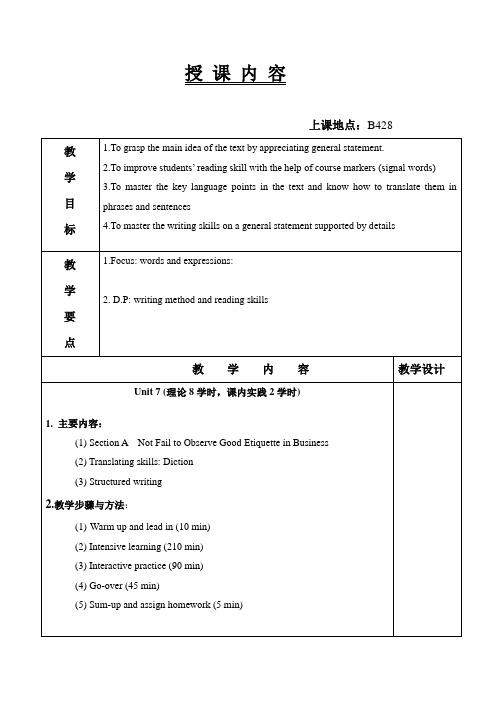
Part One( 1 ) is an introduction.
Part Two(2~ 7) analyzes the advantage of knowing etiquette.Part Three(8~15) convinces readers of possessing good etiquette.精讲内容(包括①要点、重点、难点;②互动设计;③板书设计)
Related information
1. Since Confucius wrote the first rules of decorum, etiquette has been questioned, changed and argued as to its importance. 1)该句表达了人们对礼仪重要性的质疑态度。2) as to:关于,至于,就……而论e.g. As to tax, that will be deducted from your salary.【拓展】as for:关于,至于,就……而论in terms of:在……方面,就……而言2. provoke: vt.(使)产生,引起e.g. Paul’s being nominated as the new CEO of the company has provoked a shocked reaction among board members.【拓展】provocation: n.挑衅,刺激,激怒3. shrink: vi. (shrank, shrunk)退缩,畏缩;(使某物)收缩,萎缩e.g.①He shrunk back against the wall as he heard them approaching.②My sweater shrank in the wash.4. All of us can attest to situations in which, if we had known what to do, it could have saved us embarrassment or even a job. 1)该句为过渡句,承上启下,为下文的举例论证作铺垫。2)该句的主干为:all of us can attest to situations。名词situations作为先行词,后面是介词in和关系代词which引导的限制性定语从句。在定语从句中又包含一个if引导的虚拟条件句,对过去的情况进行假设。在if引导的虚拟条件句中,表示对过去情况的假设,从句用过去完成时态,主句用would / could / should / might + have done。e.g.If I had known the fact, I wouldn’t have blamed her so much.3) embarrassment: n.害羞,窘迫;困境,使人为难的处境e.g.①Much to her embarrassment, she realized that everybody had been listening to her.②His resignation will be a severe embarrassment to the company.
应用型大学英语视听说教程3unit 7 Nature or Nurture
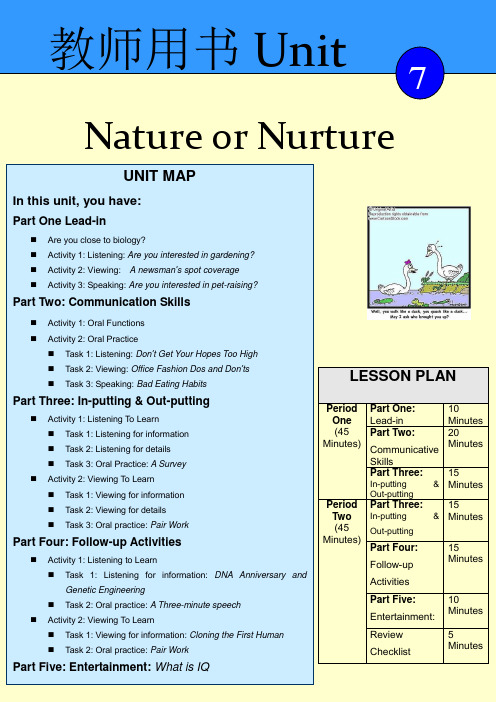
视听说第三册教师用书样章厦门大学嘉庚学院2010-02-03Part Ⅰ: Lead-inNature or NurtureLESSON PLANPeriod One (45 Minutes)Part One: Lead-in 10 Minutes Part Two: Communicative Skills20 MinutesPart Three:In-putting & Out-putting15 MinutesPeriod Two(45 Minutes)Part Three: In-putting & Out-putting 15Minutes Part Four: Follow-upActivities 15MinutesPart Five: Entertainment: 10 Minutes Review Checklist5Minutes教师用书UnitUNIT MAPIn this unit, you have:Part One Lead-in ⏹ Are you close to biology? ⏹ Activity 1: Listening: Are you interested in gardening?⏹ Activity 2: Viewing: A newsman ’s spot coverage ⏹ Activity 3: Speaking: Are you interested in pet-raising? Part Two: Communication Skills ⏹ Activity 1: Oral Functions ⏹ Activity 2: Oral Practice ⏹ Task 1: Listening: Don ’t Get Your Hopes Too High ⏹ Task 2: Viewing: Office Fashion Dos and Don ’ts ⏹ Task 3: Speaking: Bad Eating Habits Part Three: In-putting & Out-putting ⏹ Activity 1: Listening To Learn ⏹ Task 1: Listening for information ⏹ Task 2: Listening for details ⏹ Task 3: Oral Practice: A Survey ⏹ Activity 2: Viewing To Learn ⏹ Task 1: Viewing for information ⏹ Task 2: Viewing for details ⏹ Task 3: Oral practice: Pair Work Part Four: Follow-up Activities ⏹ Activity 1: Listening to Learn ⏹ Task 1: Listening for information: DNA Anniversary and Genetic Engineering ⏹ Task 2: Oral practice: A Three-minute speech ⏹ Activity 2: Viewing To Learn⏹ Task 1: Viewing for information: Cloning the First Human ⏹ Task 2: Oral practice: Pair WorkPart Five: Entertainment: What is IQ Review Checklist7Part One Lead-inAre you connected to biology?Teaching tips:Teachers are expected to make the students understand the category of biology and know that so many aspects of our daily lives, such as pet-raising and gardening, are concerning biology and we are close to biology.ACTIVITY 1 LISTENINGDirections: Listen to the following dialogue and choose the best answer to each question. Before that, please check (√) the words and phrases thatyou know.Tapescript:Are You Interested in Gardening?Gardening is a very popular activity in Britain, with many people taking pride in making their gardens look as pretty as possible. But what do people in the UK like to grow in their gardens? Is it only flowers and trees, or do people also like to grow vegetables and fruits that they can eat?Andrea Rose and Jean Dong talk to find out about the latest trends in gardening in Britain.Jean: I often hear some British say they have green fingers, what does that mean? Andrea: When we say someone has green fingers we don’t mean their fingers are actually green in colour. What we mean is they are good at gardening andlike plants.Jean: Why has planting vegetables in gardens become so popular?Andrea: It’s partly the recession. It’s partly if you grow your own vegetables you know what you’ve put into the ground. You know that they’re maybeorganic. You know that they’re grown locally and not been transporte dhalfway across the world. I think, it is also for children and also just for theenjoyment of growing vegetables.Jean, I’m interested to know, do lots ofpeople in China grow their own food?Jean: Well, not that many. Because in China, not so many people could have a personal garden, especially those who live in the cities.Andrea: Oh, I see.Teaching tips:⏹Teachers let the students be familiar with the words and phrases in the column.⏹Teachers let the students listen to the conversation from the beginning to the endonce to see to what extent that the students can take the notes of the questions.Then let the students listen to the tape again by dividing the tape into 4 parts to leave enough span of pause, making the students take down the answers of the 4 questions.Check up the answers:1. C2. D3. AACTIVITY 2 VIEWINGVideo Transcript:A Newsman’s Spot CoverageA:Since Dolly was cloned, were any other animals cloned by the scientists?B:Well, since the birth of Dolly, scientists have cloned other mammals including monkeys, pigs and goats.A: Is it possible to clone humans?B: You are so creative. (漏录)Yes, indeed some researchers began to openly talk about cloning humans. But other experts argued that there is too much risk. A number of countries banned human cloning.A: What is the use of cloning so many animals?B: In American industry, some companies produce cloned animals to sell, but they have not been approved to sell as food. Cloning could provide a simpler, cheaper way to reproduce farm animals. People may want to reproduce pets that have died. Clones could also help save endangered animals such as the African wild cat from disappearing.A: Is it really possible to clone any human organs? Why are the scientists so interested?B: Yes! Scientists say cloned pigs might solve the shortage of human organs needed for transplant. Pigs and people(顺序颠倒)are biologically similar. So pigs may provide kidneys, hearts and other organs.Check up the answers:1. mammals2. creative3. experts4. approved5. cheaper6. shortage ACTIVITY 3 SPEAKINGDirections: Work in pairs, discuss the following questions and then share your opinions with the whole class.Are You Interested in Pet-raising?Teaching tips:⏹Teachers are expected to require the students to work in pairs, and then ask oneor two groups to present their own discussions.⏹Ask students to design tips for raising pets in winter or in summer.Part Two: Communication SkillsACTIVITY 1 ORAL FUNCTIONSIn English when people need to express Negative Ideas in certain situations, they use negative sentences. Useful sentence patterns that are commonly used are listed as follows.Directions: Read the following expressions. Underline those words expressing negative ideas.Negative IdeasI am not a good swimmer.He was not at home yesterday afternoon.There weren't many people at the party yesterday.I am not ready.You aren't going to go to her birthday party, are you?I haven't done anything wrong to her.The old man cannot find his way home.You ought not to swim in the river.You had better not tell her everything.She never comes to school late.She seldom comes to see me.I could hardly understand that poem.He has few friends in Hong Kong.I know nothing about computer.I found nobody had a computer.He is dishonest.They are childless.This digital camera is waterproof.Teaching tips:⏹In oral English, “be/have +not” usually appear in shortened forms, like“isn’t/aren’t/haven’t”.⏹In American English, “n’t” is commonly used for aren’t, isn’t, haven’t, hasn’t, etc. ACTIVITY 2 ORAL PRACTICETask1ListeningDirections: Listen to the conversation and fill in the blanks.Tapescript:Don't Get Your Hopes Too High!Nail: T hey'll never help us. You know that old saying, "You can't get blood out of a turnip."Peter: I know, I know. But that's no reason not to ask them.Nail: We asked them last year and what did they say?Peter: Actually, they didn't say anything.Nail: Yeah. They didn't say anything and they didn't do anything.Peter: I think they might do something this year. I was talking to Gail last week and I thought I detected a more friendly attitude.Nail: There you go with your optimism! Don't get your hopes up too high!Peter: I won't, but it doesn't hurt to expect the best. Sometimes you get it!Task 2 ViewingDirections: Watch the video Office Fashion Dos and Don’ts twice, and then read the following clothes list. Which of them are acceptable in an officeand which of them are not? Classify them in the boxes of Dos andDon’ts.Video Transcript:Office Fashion Dos and Don'tsHey guys, Jonathon Stewart here for . So, you've got a job. If you're lucky, it's the one that allows you to wear pretty much whatever you want to work. But, for the scores of millions of Americans who punch a clock at the office, attire is not usually quite so laid back, unless you work at Google. But try these office fashion dos and don'ts on for size and you're guaranteed to look your best, not getting fired for wearing something stupid. Check it out.Before you put anything on, it's probably best to check out your company-specific dress code. A number of offices are business casual, but rules can vary, so before you get into a tangle with a supervisor, be sure you know the company line, which hopefully is something like, "Heck, every day’s Friday here!" Oh wait, that was a restaurant I used to work at.As a general rule, avoiding the following is probably best: sweat pants, sneakers, T-shirts, sloppy items like ripped jeans, revealing items like spaghetti straps, strapless tops, or tank tops, flip flops, cheap suits, or anything polyester. You should probably also avoid wearing baseball hats and bandanas, or any combination thereof.Instead, stick to cleaned and pressed pants and button down shirts, skirts no shorter than just above-the-knee, v-neck sweaters, shoes that cover both your heel and toes, and camisoles—as long as they're in good taste and worn under a jacket. For women, that is. I really look good in a camisole. Jeans are part of the middle ground. If you do opt to wear them, make sure they're straight-legged, dark, and absent any "wear lines" or other markings. Many companies only allow jeans on casual Friday. Just remember, the casual Friday in any company does not equal Slobby McSlobberson Friday.It's also best to avoid wearing any strongly scented perfume or cologne, unless your office is in Paris. As for facial hair, it's generally discouraged in the office, but if you insist on a stash or a beard, make sure they are neatly trimmed, and make you looked distinguished.Alright. I'm shaving it. Thanks for watching. To learn more, visit us on the Web at .Reference Answers:Don’ts DosTask 3 SpeakingDirections: For the sake of health benefit, people should pay attention to whatthey eat and how they eat everyday. There are some foods or eating habits that are harmful to peop le’s health. Discuss with your partner, note down the results and present them to the class using the following structure.Bad Eating HabitsDeep fried food like French fries is bad for your health. Preserved food (preserved egg) is not healthy, either. Stop eating overnight leftovers, because it will produce some harmful substance that can increase your risk of getting cancer. Don’t skip breakfast, for it is believed to be the most important meal of a day and provides you with the basic energy you need for a whole day . You’d better not drink coffee or tea immediately after each meal. You should also avoid eating snacks after 9 in the evening. If you can stay away from these bad habits, there is no reason that your health cannot be improved.⏹ Instruct students to think of their own eating habits first. Which is healthy andwhich is not healthy?⏹ Have them think about the eating habits of other people they know. Givecomments on these habits.Teaching tips: sweat pants, sneakers, T-shirts, ripped jeans, spaghetti straps, strapless tops, tank tops, flip flops, cheap suits, baseball hats and bandanaspressed pants, button down shirts, skirts above-the-knee, v-neck sweaters, camisolesPart Three In-putting & Out-puttingACTIVITY 1 Listening to LearnIn this section, you will hear two friends, Zhang Jin and Lin Yun, talking about The Importance of EQ. Before you listen to their dialogue, think about the following questions:⏹What is IQ? And what is EQ?⏹Which one do you think is more important for job hunting, IQ or EQ?Teaching tips:IQ: Abbreviation for intelligence quotient: a measure of someone's intelligence found from special testsEQ: Abbreviation for Emotional Quotient, is how one measures Emotional Intelligence.Tapescript:The Importance of EQZhang Jin: I read the news yesterday that a young man killed himself by jumping off a building.Lin Yun: Oh,Yeah! T hat’s terri ble. Why would a young man want to kill himself? Zhang Jin: I think there are many reasons for that. Many young men are under great pressure because of their heavy work load or the keen competition on thejob market. Or they might just break up with their boyfriend or girlfriend. Lin Yun: Have you heard about EQ? Unlike IQ, it is not to measure how smart you are but to test how good a person is at dealing with difficulties. It seems tome that the education has put too much weight on IQ, and maybe that’spart of the reasons things turn out so bad sometimes.Zhang Jin: Hum, that’s interesting.Lin Yun: A good EQ is important for everyone’s success.Zhang Jin: Yes, I can’t agree with you more.Task 1 Listening for InformationDirections: Listen to the dialogue once and decide whether each of the following statements is true or false. If it is false, correct it.Check up the answers:Statements True/FalseCorrect Answer1. According to Zhang Jin, some young mencommitted suicide because they got a disappointing score and failed the exam. FSome young men commitsuicide because they are undergreat pressure. Or they mightjust break up with their boyfriendor girlfriend.2. EQ is a test to measure how smart you are. FEQ is to test how good a personis at dealing with difficulties.3. Too much attention has been paid to IQ.T4. EQ is important for one’s success.TTask 2 Listening for DetailsDirections: The following broken sentences are taken from the dialogue. Listen carefully and complete each of them with a verbal phrase in theright form.1. I read the news yesterday that a young man killed himself by jumping off a building.2. Or they might just break up with their boyfriend or girlfriend.3. It seems to me that the education has put too much weight on IQ, and maybe that’spart of the reasons things turn out so bad sometimes.4. Yes, I can’t agree with you more.Task 3 Oral PracticeDirections: Do a survey. Ask your classmates about their opinions on The Importance of IQ. Then explain the results of your survey to theclass.Video: Riddles of the Death—Einstein’s GeniusFrom: National Geographic ChannelMore for teachersACTIVITY 2 Viewing to LearnIn this section, you will watch a brief news report on The Youngest Member of High-IQ Club. Before that, please check the words and phrases that you know. Video Transcript:The Youngest Member of High-IQ Club.At the tender age of 28 months, Elise Tan-Roberts has become Britain's youngest member of high-IQ club, Mensa.The society's UK chapter has confirmed that the child is its youngest-ever member but it's still uncertain whether she is also the youngest on record in Mensa's more-than 40 national chapters all around the world.The girl's father, Edward Nosegbe-Roberts, says it was clear to him that Elise was “very quick and observant” even at a very young age.Mensa was set up in England in 1946, and has about 100,000 members worldwide. It's essentially a society reserved for individuals who are considered intelligent, based on how they score in standardized testing.Mensa does not directly evaluate young children, but in the case of Elise Tan, the test was performed by an educational psychologist, according to the British paper, The Daily Mirror.Task 1 Viewing for InformationDirections: Watch the report once and choose the best answer to each of the following questions. The questions should help you understand themain idea and the structure of the dialogue.Check up the answers:1. C2. B3.B4.ATask 2 Viewing for DetailsDirections: Numbers appear very often in our life, e.g. doing business, shopping, etc. There are also some numbers in this report. Listen again, take down the numbers and then fill in the following blanks with keys underlined.1. At the tender age of 28 months, Elise Tan-Roberts has become Britain's youngestmember of high-IQ club, Mensa.2. It's still uncertain whether she is also the youngest on record in Mensa's more-than40 national chapters across the world.3. Mensa was set up in England in 1946, and has about 100,000 members worldwide.Task 3 Oral PracticeDirections: Work with a partner. Student A reads the numbers in GroupA.Student B listens and repeats them without looking at thetextbook. Then take turns and keep on practicing numbers in GroupB. Continue this exercise until both of you can pronounce and hearall the numbers correctly.Check up the answers:Group A14 40 fourteen forty70 17 seventy seventeen58 48 fifty-eight forty-eight149 one hundred and forty-nine118,170 one hundred and eighteen thousand, one hundred and seventy 857,951,000 eight hundred and fifty-seven million, nine hundred and fifty-one thousandGroup B50 15 fifty fifteen90 19 ninety nineteen875 eight hundred and seventy-five857 eight hundred and fifty-seven90,050 ninety thousand and fifty4,875,480,000 four billion, eight hundred and seventy-five million, four hundred and eighty thousand ORfour thousand eight hundred and seventy-five million, fourhundred and eighty thousandCultural LinkBritish English Numbers & American English numbers116: one hundred and sixteen(British)one hundred sixteen(American)1,800: one thousand, eight hundred (British)eighteen hundred (American)6,000,000,000: six thousand million (British)six billion (American)Part Four Follow-up ActivitiesACTIVITY 1 LISTENING TO LEARNTask 1 Listen for InformationDirections: Choose the correct answer to each question with the information you hear in this Scientific Report: DNA Anniversary and GeneticEngineering.Before that,check(√) the words and phrases that youknow.Tapescript:DNA Anniversary and Genetic EngineeringMany of the possibilities for DNA research involve genetic engineering, including the creation of clones---- genetic copies of organisms. The birth of Dolly the sheep in 1996 caused excitement.But some see her death recently as a warning of the risks of cloning. Others, though, say cloning may help scientists improve animal productivity and find cures for human diseases.Dolly was not only the largest mammal ever cloned. She was also the first to be cloned from a cell taken from an adult animal. In other cases, researchers worked from undeveloped cells.Dolly's birth followed years of researches and hundreds of failed attempts. Many animals died during these experiments, including ones malformed at birth.1. B2.C3. B4. CTask 2 Oral PracticeDirections: Look carefully at the following pictures and topics, then pick one ofthem. Present a three-minute speech on it in front of your class. Try to use as many as possible useful expressions and ideas that you’ve learned in this unit.● Ask students to prepare for this part before class.● Let students limit their presentation within three minutes. ● Presentation skills need to be introduced to students. ● Evaluation is necessary after students ’ presentation.The Three Presentation Essentials - Use visual aids where you can - Rehearse, rehearse, rehearse.- Chances are that the audience will only remember three messages⏹ Plan in advance what these three messages will be⏹ There are three parts to your presentation: The beginning, themiddle and the end.⏹ Use lists of three wherever you can in your presentation. If you havefour points to get across - cut one out. They won't remember it anyway.More for teachers Teaching TipsCTIVITY 2: VIEWING TO LEARNTask 1 Viewing for InformationDirections: Watch the video of the scientific news report Cloning the First Human. Fill in the blanks with the information you hear.Video Transcript:Cloning the First HumanCloning would be a completely new way of making a human being. Instead of a combination of father’s sperm and mother’s egg that ma ke each of us unique, cloning would create a baby from a single cell from a single person. The clone would be an identical genetic copy.“Cloning does not create anything new; it creates a genetic copy of an existing being. People have an extraordinary emotional reaction to cloning because it conjures up all sorts of images. Duplication, the images from science fiction of factory reproduction and it really makes them face the notion that our technology is going to allow us to intervene even in the most intimate processes of our lives, so this is really big stuff.”Whatever its opponents say, there are people who would try the new technology. For infertile couples who can not make babies with sperms and eggs, cloning is a medical breakthrough that could give them children of their own.Check up the answers:1. Cloning2. genetic3. extraordinary4. intervene5. intimate6. stuffTask 2 Oral PracticeDirections: Read the following dialogues and make up a conversation with your partners with the expressions in the box and the topic of cloning.Word Tips:be out of one’s mind: be madbe in nature: be practicalTeaching Tips:Guide students to answer the following questions in order to make up a conversation of their own:⏹Do you want a clone of yourself? Why or why not?⏹Do you think clone is in nature?⏹How far will modern cloning technologies go?◆What is IQ?Check up the answers:1. B2. C3. ETHE END。
《新编实用英语》教案第一册Unit7
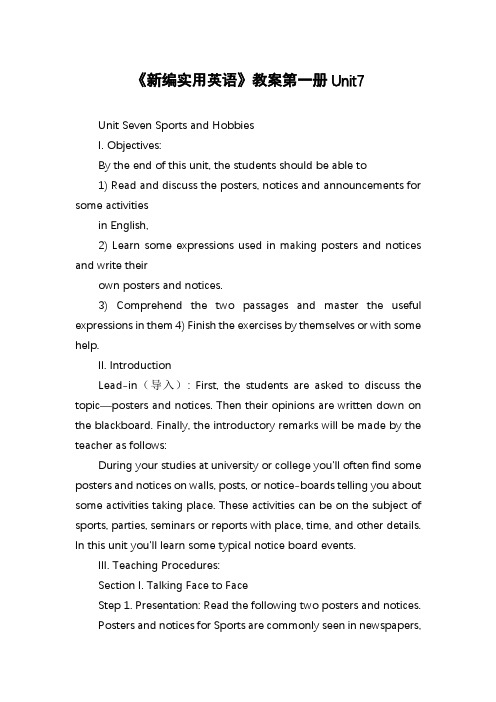
《新编实用英语》教案第一册Unit7Unit Seven Sports and HobbiesI. Objectives:By the end of this unit, the students should be able to1) Read and discuss the posters, notices and announcements for some activitiesin English,2) Learn some expressions used in making posters and notices and write theirown posters and notices.3) Comprehend the two passages and master the useful expressions in them 4) Finish the exercises by themselves or with some help.II. IntroductionLead-in(导入): First, the students are asked to discuss the topic―posters and notices. Then their opinions are written down on the blackboard. Finally, the introductory remarks will be made by the teacher as follows:During your studies at university or college you'll often find some posters and notices on walls, posts, or notice-boards telling you about some activities taking place. These activities can be on the subject of sports, parties, seminars or reports with place, time, and other details. In this unit you'll learn some typical notice board events.III. Teaching Procedures:Section I. Talking Face to FaceStep 1. Presentation: Read the following two posters and notices.Posters and notices for Sports are commonly seen in newspapers,on campus and on notice-boards (通知栏).Sample 1*****ALL MATCHTeams: Binhai University vs. Normal UniversityTime: 8: 30 a.m., Nov. 24, 2001 (Saturday)Place: Provincial Gymnasium (省体育馆)Sponsor (赞助人): The Physical Culture Academy (学会)Please contact the Physical Culture Academy for tickets (limited to 100). Basketball fans should hurry. Three school buses will take fans to the match. Fans are expected togather in front of the library at 8:00 sharp the day of the game.篮球赛参赛队:滨海大学:师范大学时间:2021年11月24日(周六)上午8:30 地点:省体育馆赞助人/主办单位:体育学会请与体育学会联系定票事宜(限定人数为100人),欢迎篮球迷们踊跃观战。
大学英语3unit7教案
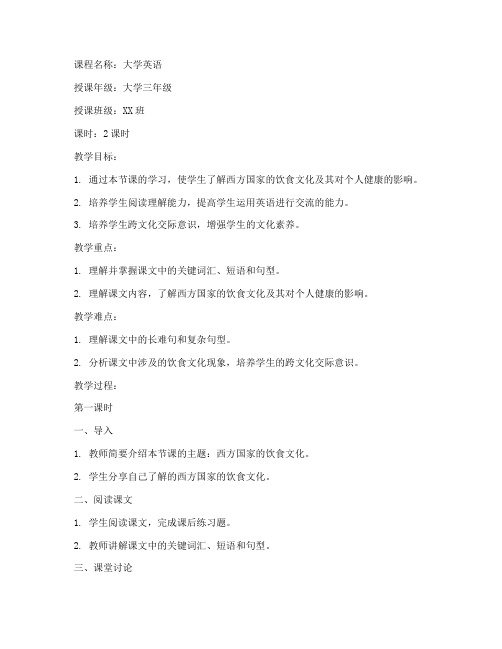
课程名称:大学英语授课年级:大学三年级授课班级:XX班课时:2课时教学目标:1. 通过本节课的学习,使学生了解西方国家的饮食文化及其对个人健康的影响。
2. 培养学生阅读理解能力,提高学生运用英语进行交流的能力。
3. 培养学生跨文化交际意识,增强学生的文化素养。
教学重点:1. 理解并掌握课文中的关键词汇、短语和句型。
2. 理解课文内容,了解西方国家的饮食文化及其对个人健康的影响。
教学难点:1. 理解课文中的长难句和复杂句型。
2. 分析课文中涉及的饮食文化现象,培养学生的跨文化交际意识。
教学过程:第一课时一、导入1. 教师简要介绍本节课的主题:西方国家的饮食文化。
2. 学生分享自己了解的西方国家的饮食文化。
二、阅读课文1. 学生阅读课文,完成课后练习题。
2. 教师讲解课文中的关键词汇、短语和句型。
三、课堂讨论1. 教师引导学生讨论以下问题:(1)西方国家的饮食文化有哪些特点?(2)饮食文化对个人健康有何影响?(3)我们应该如何借鉴西方国家的饮食文化?四、总结1. 教师总结本节课的学习内容,强调西方国家的饮食文化及其对个人健康的影响。
2. 学生回顾本节课所学内容,巩固所学知识。
第二课时一、复习导入1. 教师提问:上节课我们学习了哪些内容?2. 学生回答,教师点评。
二、阅读理解1. 学生阅读课文,完成课后练习题。
2. 教师讲解课文中的长难句和复杂句型。
三、课堂讨论1. 教师引导学生讨论以下问题:(1)如何判断一种饮食文化是否健康?(2)我们应该如何根据自己的体质选择适合自己的饮食?(3)在全球化背景下,如何传承和发扬我国优秀的饮食文化?四、总结1. 教师总结本节课的学习内容,强调饮食文化对个人健康的重要性。
2. 学生回顾本节课所学内容,巩固所学知识。
五、作业布置1. 完成课后练习题。
2. 收集有关我国饮食文化的资料,下节课进行分享。
教学反思:本节课通过阅读课文、课堂讨论等形式,使学生了解了西方国家的饮食文化及其对个人健康的影响。
应用型大学英语综合教程3Unit7电子教案

Unit SevenA. Objectives of this unita. Content1. A victim of 107 fatal maladies.2. Discussion: Factors contributing to hypochondria.3. A passage: What is meant by mental health?4. Temple treatment for psychiatric illnessb. Key language points1. Double negation such as…never…without….2. Word-building: Adjective formed with noun + -ly such as cowardly.3. Rhetorical devices such as hyperbole, anti-climax.4. Clause connectors.c. V ocabularyBasic requirements: 39 new words.Intermediate requirements: 15 new words.Advanced requirements: 11 new words.d. Comprehensive skills1. Understanding a passage of about 1200 words at the advanced level of difficultyand summarize the text with approximately 180 words.2. Surfing the Internet to sum up the characteristics of mental health.3. Using teamwork to complete the project of preparing a CV for James Blake.e. Functions1. Discussing the symptoms of psychological or metal problems.2. Holding discussions about ways to maintain good mental health.3. Communicating successfully during psychological counseling.B. Procedures and MethodsEight teaching periods are needed to cover the present unit, among which four periods are for the module of Language Skills Development, three periods for the module of Language in Use and one mainly for the module of Enhancement of Language Abilities.1. Period One and Period Two:●Step One: StarterA. Look at the picture. Suppose he is your friend, and is possibly mentally ill. Answer the following questions.B. Listen to a news report. Then fill in the blanks.Before playing the tape, the instructor can ask the students to take a look at the new expressions in Mind Map first.Then the instructor tells the students to listen to the news report and do the exercise.This step shall take up 10-15 minutes.●Step Two: New words and expressionsGo over the new words and expressions in the text (refer to Student‟s Book Pages 181-184) to prepare students for the text learning.The time for this step should not exceed 10 minutes.●Step Three: Text teachingStart teaching the text: A Victim of 107 Fatal MaladiesBefore delving into the text, the instructor can ask the students a general question about it such as “Is there any person who has a tendency to imagine himself ill around you?”After that, the text organization chart will be presented so that the students can expand each episode.Then start the detailed study of the text and go through the text paragraph by paragraph. To help students understand the story, the instructor can explain the language points and ask students to answer the questions related to the text.This step shall not take up more than one and a half periods.Notes to Para. 11. A Victim of 107 Fatal Maladies一个身患107种致命疾病的患者victim:n. 1) [C] 受害者,牺牲者e.g.Most of the victims were shot in the back while trying to run away.The victim of the accident was taken to hospital.2) [C] 受骗者,上当的人e.g. They were the victims of a cruel hoax.Note the use of different prepositions in the two expressions: to is preferred in “fall a victim to …” while of is more common in “become the victim of …”.fatal: a. 1) 致命的e.g.Her children‟s death is a fatal blow on her.2) 灾难性的,毁灭性的e.g.Graf made a fatal mistake halfway through the match.Synonym: deadly2. It is a most extraordinary thing, but I never read a patent medicine advertisementwithout being forced to draw the conclusion that I am suffering from the particular disease said in the ad and dealt with in its most deadly form. 此事绝对非同小可,只要我一看到专利药品的广告,就会不自觉地得出结论: 我患上了广告中所说的疾病,并且已经病入膏肓。
应用型大学英语综合教程发展篇2 第四版 Unit 7 Emotional Intelligence

Task: Emotional intelligence (EI), also known as emotional quotient (EQ), is
the capability of individuals to recognize their own emotions and those of others, discern between different feelings and label them appropriately, use emotional information to guide thinking and behavior, and manage and/or adjust emotions to adapt to environments or achieve one’s goal(s). It generally consists of awareness, empathy,self-regulation, motivation, social skills and happiness. Then discuss which one is more important to become successful in life, emotional intelligence or IQ? Why?
1. Listen to the passage and judge whether the following statements are T (true) or F (false).
视频原文
1. Listen to the passage and judge whether the following statements are T (true) or F (false).
大学英语综合教程 教案_U7
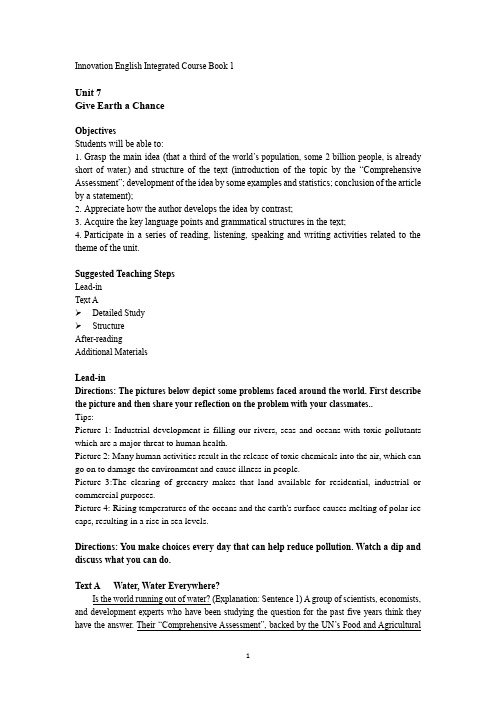
Innovation English Integrated Course Book 1Unit 7Give Earth a ChanceObjectivesStudents will be able to:1.Grasp the main idea (that a third of the world’s population, some 2 billion people, is already short of water.) and structure of the text (introduction of the topic by the “Comprehensive Assessment”; development of the idea by some examples and statistics; conclusion of the article by a statement);2.Appreciate how the author develops the idea by contrast;3.Acquire the key language points and grammatical structures in the text;4.Participate in a series of reading, listening, speaking and writing activities related to the theme of the unit.Suggested Teaching StepsLead-inText A➢Detailed Study➢StructureAfter-readingAdditional MaterialsLead-inDirections: The pictures below depict some problems faced around the world. First describe the picture and then share your reflection on the problem with your classmates..Tips:Picture 1: Industrial development is filling our rivers, seas and oceans with toxic pollutants which are a major threat to human health.Picture 2: Many human activities result in the release of toxic chemicals into the air, which can go on to damage the environment and cause illness in people.Picture 3:The clearing of greenery makes that land available for residential, industrial or commercial purposes.Picture 4: Rising temperatures of the oceans and the earth's surface causes melting of polar ice caps, resulting in a rise in sea levels.Directions: You make choices every day that can help reduce pollution. Watch a dip and discuss what you can do.Text A Water, Water Everywhere?Is the world running out of water? (Explanation: Sentence 1) A group of scientists, economists, and development experts who have been studying the question for the past five years think they have the answer. Their “Comprehensive Assessment”, backed by the UN’s Food and AgriculturalOrganization and various research institutes governments, and aid groups will be released in November. (Explanation: Sentence 2) But during World Water Week, a conference now underway in Sweden, they have revealed some early findings. (Explanation: Sentence 3) The bad news is that a third of the world’s population, some two billion people, is already short of water.(Explanation: Sentence 4) But things do not have to be this way.Roughly 900 million people,the assessment finds, live in river basins where there is barely enough water to keep rivers flowing and lakes filled. (Explanation: Sentence 5) Another 700 million live in basins rapidly approaching this “closed” state, and a billion more live within reach of adequate water supplies but cannot afford to make use of them. (Explanation: Sentence 6) The water table is falling fast in densely populated and poor regions of China, Mexico and India. If current trends in water consumption continue, these grim statistics will only worsen.The main cause is agriculture. It takes roughly 3,000 litres of water to grow enough for one person for one day,or about a litre for each calorie. Demand for water will grow as the world’s population increases and as people eat more — and more meat in particular. Raising livestock requires more water, per calorie, than growing crops. So the assessment suggests that, by 2050, agriculture will consume twice as much water as it does today.(Explanation: Sentence 7) Industrial and domestic use,which now accounts for only a small fraction of water consumption, is also growing quickly. (Explanation: Sentence 8) Global warming adds another layer of uncertainty and risk.In theory, the world would still have more than enough water to feed everyone. But it might require much more food to be traded from sodden parts of Europe, North America, and Russia to dry bits of Africa and Asia. Needless to say, farmers on those continents are in no position to pay for imports of food — and will become even poorer if their water runs short. (Explanation:Sentence 9) A few poor, dry and heavily populated countries, such as Egypt, already depend on food imports, along with the odd rich ones, like Japan. (Explanation: Sentence 10) But most governments are reluctant to put their consumers at the mercy of the world’s imperfect markets.Instead, governments have traditionally tried to increase agricultural output through huge and expensive irrigation projects. But smaller investments in simple devices such as pumps to tap groundwater, are faster to deploy, yield greater returns on capital and bring fewer environmental and social problems. (Explanation: Sentence 11) Modest investments on rain-fed agriculture in particular, could sharply raise farmers’ productivity in poor countries, and so help both to lift their incomes and to reduce the need for an expansion of agriculture elsewhere.Over half of world’s food comes from rain-fed farms, as opposed to irrigated ones. (Explanation:Sentence 12) Most of the world’s poorest farmers, including the vast majority in Africa, rely on rain for their livelihoods. If the rains fail, so do the crops. Channels to harvest and direct rainfall, and small reservoirs or tanks to store it, would not only see them through dry spells, but also allow them to get bigger harvests out of the same fields. If adopted on a grand scale, the assessment argues, such techniques could double crop yields. (Explanation: Sentence 13) In that case, the area under cultivation globally would only have to rise 10% to meet rising demand for food — and there would be plenty of water to go round.(Explanation: Sentence 14)Detailed Study1.Is the world running out of water?【译文】全球水资源快耗尽了吗?run out:1) (~of sth.) to be used up, finished or exhausted 用完,耗尽e.g. We are running out of petrol.我们的汽油快耗尽了。
应用型大学英语视听说教程发展篇2 第四版 Unit 7 Emotional Intelligence

Part One Lead-in
Group Work
视频 视频原文
Watch the video about the traits of emotionally intelligent people and write down the missing words or phrases. Based on this information, discuss with your classmates who own these traits.
approachable and open. They’re fair and responsive. They have developed a high stress tolerance. They’re decisive but also flexible when things change. If a product fails or 3__a_d_e_a_d_l_in_e__m_o_v_e_s_u_p__ , high emotional intelligence people don’t ruminate over it. They know how to 4__p_u_t_t_h_in_g_s_i_n_p_e_r_s_p_e_c_ti_v_e___ and move
__th_a_t_e_n_h_an_c_e_s_li_vi_n_g.____________________________________________________________
3. What is the name of the book that contributes to the popularity of emotional intelligence?
- 1、下载文档前请自行甄别文档内容的完整性,平台不提供额外的编辑、内容补充、找答案等附加服务。
- 2、"仅部分预览"的文档,不可在线预览部分如存在完整性等问题,可反馈申请退款(可完整预览的文档不适用该条件!)。
- 3、如文档侵犯您的权益,请联系客服反馈,我们会尽快为您处理(人工客服工作时间:9:00-18:30)。
thick-witted.
(4) retort: vi. 反驳
e.g. He retorted that it was all my fault. He retorted that I was to blame. 3. Check the students’ pronunciation of each word: ask one or two students to be the leader and the
(1)inflexible: a. 1) not permitting change 不可更改的
e.g. Since it is an inflexible rule, why do you want to break it?
2) incapalbe of adaping or changing to meet circumstances 不灵活的,顽固的
Student-oriented communicative teaching, Free discussion and interaction, multi-media
Emphasis is placed on: 1. The structure “no + n./a.” as opposed to “not + n./a.” for expressing negation. 2. The elliptical comparative structure of “as + many (much)” with the second “as...” omitted. Difficulty in teaching: 1. Pattern of organization: Comparison and contrast.
You are not stronger than your brother (You are not as strong as your brother).
2)“I’m very sorry, sir,” he articulated with instructive courtesy.
►Note the sarcasm in the combination of the two contradictory words, “instructive”nce between “no + n./a.” and “not + n./a.”, the former is more emphatic than the latter.
e.g. You are no stronger than your brother (You are as weak as your brother).
other students follow. A stone kills two birds.
Step3 Basic writing techniques: Comparison and contrast (10min.)
教
Step 4. Assignments
1) Review and recite the new words of this unit
第 1页
Note that this adjective comes from the past participle of the verb “bewilder”. Similar words are
excited, interested, frightened, disappointed, etc. (3)dim-witted: a. 笨的,傻的
e.g. They viewed him as stubborn, inflexible and dogmatic. ★利用词根词缀记忆法
flexible 形容词,加前缀-in 构成其否定词,意思是不灵活的 (2)bewildered: a. confused 迷惑不解的
e.g. I am totally bewildered by the clues to this crossword puzzle.
Step2. Intensive reading (55)
1. Difficult Sentences and Patterns
1) the subject of the Magna Carta of the Argentine Locksmiths’ Union is no joking matter.
Step 2 Listen to a story and answer the questions.
2. While-reading activities (15min.)
Step 1 Lead in
学
生 1. Questions for open discussion (group work)
互
1) Do you feel lonely in life? 2) What kind of life style do you prefer?
The first two periods
The emphasis is placed on the key words and phrases.
1.Pre-reading Activities (25min.)
Step 1.Discussion: Read the passage Feeling Alone — A Luxury or Misfortune and discuss in pairs.
Part II (Para. 7-40): The development of the story.
Part III (Para. 41-43): The narrator has grown old and weak, but is relatively happy.
have enough
第 2页
过
screen. Let them get the main idea of each paragraph and make clear about the text structure.
重点
Q.1:What happened to the narrator one day when he was about to go to work?
2. Hyphenated adjectives with the structure of “adjective + noun + -ed” such as dim-witted, simple-minded, etc. Assignment: 1. Free discussion : What is wrong with people or society, that they are so unhelpful to a man in serious trouble? 2. Finish the exercises following the text and preview Unit 8 Teaching Procedures:
讲解
程
► His key broke off in the lock while he was unlocking the door.
并掌
Q.2: Apart from the first locksmith, who else did the narrator try to call for help? ► He called many others for help, including twenty other locksmith shops, the janitor, his
girlfriend, and his bank colleagues. Q.3: How did the narrator try to get help using his typewriter? ► He typed a message using the typewriter and threw the sheets with the message over the railing for
河北传媒学院 授课教案
周次 章节名称
教学目的
教学手段
重点
难点
作业 教 学 内 容 与 教 学 过 程
时间
年
月
日第
节
Unit 7
授课方式 课堂讲授:(√) 实践课:( )
Teaching Objectives:
1. A lifestyle: Reflecting on how to survive in modern society.
2. To appreciate the pattern of the text: Comparison and contrast. 3. To grasp some keys words, phrases and useful sentence patterns.
Teaching Methods and Strategies:
握语 法结 构的 用法
passers-by to find and help him out.
2)Text structure
The passage poses a very serious theme, how we can survive in modern society.The passage can be
e.g. How did the dim-witted man become a general in the war?
掌握重点词 和词组
►Similar expressions: slow-witted, half-witted, simple-minded, feeble-minded, thick-skulled,
动
Step 2 New words and phrases (40min.)
